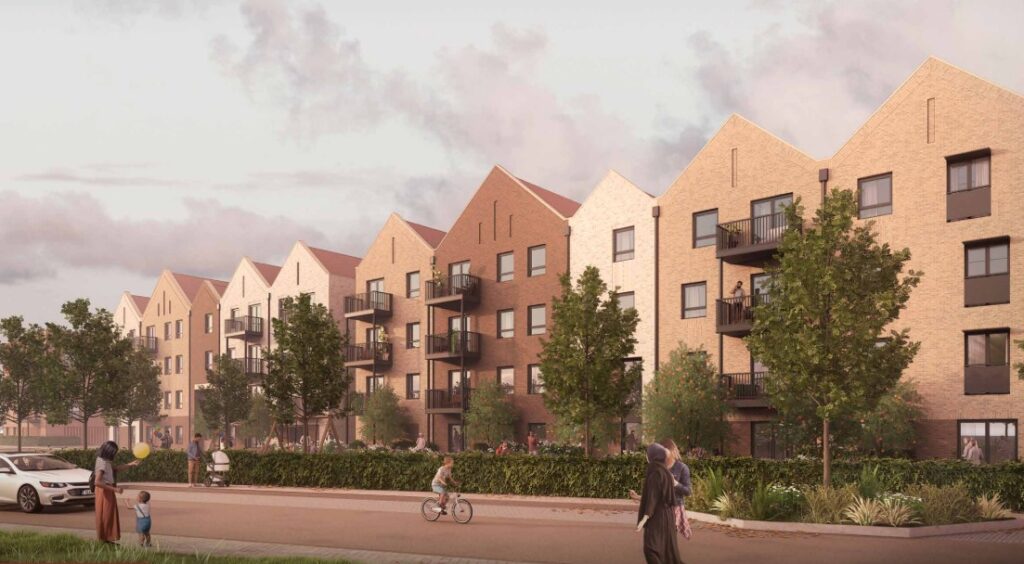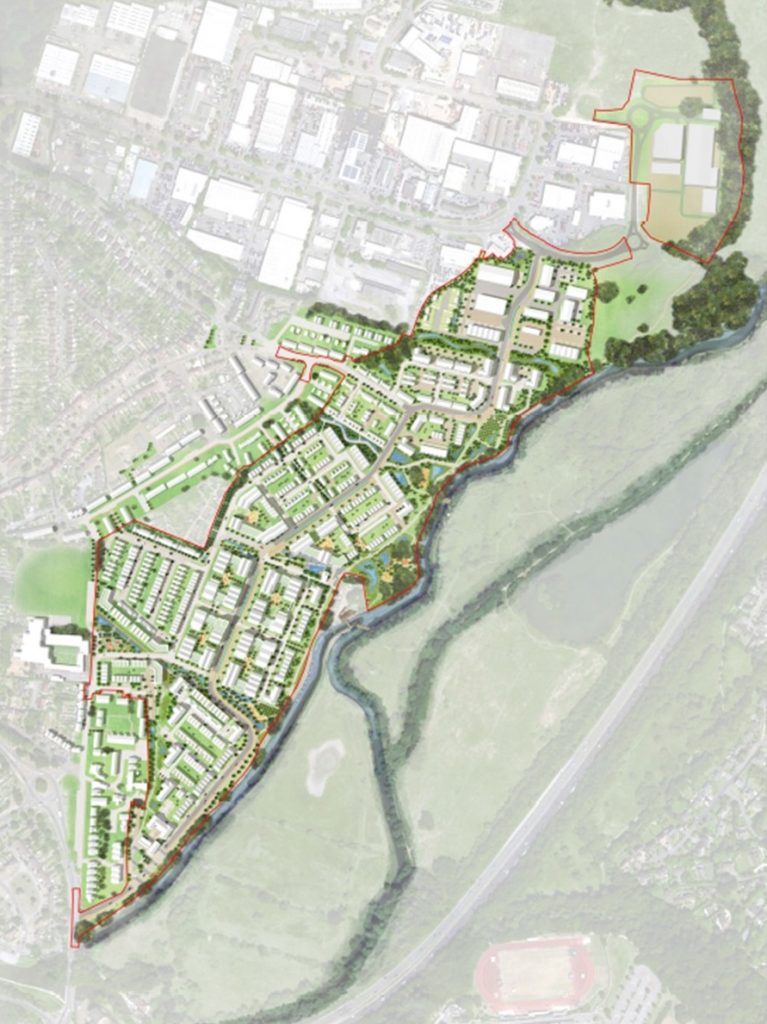 Abraham Lincoln
If given the truth, the people can be depended upon to meet any national crisis...
Abraham Lincoln
If given the truth, the people can be depended upon to meet any national crisis...
 Guildford news...
for Guildford people, brought to you by Guildford reporters - Guildford's own news service
Guildford news...
for Guildford people, brought to you by Guildford reporters - Guildford's own news service
Weyside Urban Village Update – Hard Choices Face Guildford Borough Council
Published on: 5 Dec, 2024
Updated on: 5 Dec, 2024

A CGI of the four-storey apartment blocks in phase three Weyside Urban Village development. Image: GBC
By Emily Dalton
local democracy reporter
A flagship 1,500 homes scheme could have its affordable housing reduced “as an absolute last resort” as Guildford Borough Council has to make tough decisions to reduce over a £50 million deficit.
The Weyside Urban Village (WUV) regeneration plans to create 600 affordable homes (40 per cent of total) including community buildings, employment space and improved infrastructure. The £453 million project was given outline planning permission in October 2021.
A potential deficit at the project’s end has jumped over £50 million, as of May 2024, due to high inflation and rises in borrowing rates to 5.5 per cent with a notable impact on contract costs, according to council documents.
The £50 million deficit was reported in January 2023, which the council attributed to “macro-economic factors” affecting the construction industry and the cost of materials, coupled with an increase in loan rates.
Various options to reduce the deficit were presented to the Resources Overview and Scrutiny Committee meeting on December 2. Methods included borrowing from different boards, using money from asset sales, quickly selling land to developers, long-term lending and reviewing the council’s major development programme. Reducing the number of affordable homes was floated as a “last resort”.
Cllr Phil Bellamy (Lib Dem, Ash Wharf) said he had to “hold onto the brakes” when he saw reducing the number of low-cost housing in the report, saying they are “greatly needed” in Guildford. Changing the number of affordable homes “defeats the objective of the programme,” said Cllr Richard Mills (Con, Castle).
Any reduction to the types of homes would require a planning application, taking a year to complete, and Homes England would also need to be notified that the original business case has changed.
The deputy leader of the council, Cllr Tom Hunt, said cutting the number of affordable homes is “absolutely not a lever [the council] wants to pull”, but for the sake of the complete review of the situation “it must be an option”.
Cllr Hunt said the “implications of not closing the deficit are material and unpleasant”. The increased potential deficit could have a “profound effect on the council’s financial position”, according to meeting documents.
The council’s target is to get the deficit to zero, Cllr Hunt said, as anything else will increase the cost to the council and potentially would have to decrease services. If the council does not reduce the deficit to zero, there will be an annual impact on the council’s budget with interest and paying debt on the money spent on the WUV project.
“So steeped in blood, to go backwards would be worse than going forward,” said Cllr Mills, as he projected a rather grim picture on the council’s situation by paraphrasing a line from Shakespeare’s Macbeth. He argued the council seemed to be in a mess, but it would be worse going back on the plans than continuing them.
Acting as a developer, Guildford Borough Council is trying to recover the cost of upfront infrastructure investment from the sale of ten land plots to housing developers. The council has been successful in securing grant funding from Homes England and Local Enterprise Partnership (LEP) of around £60 million.
But officers told the committee that the council will have a “cash flow issue” over the next few years as it has not completed set “milestones” in housing delivery, related to the Homes England grant. When this happens, grant payments are stopped and the council will have to pay out of its pocket.
The original case to finance development was that land sales income was to cover the cost of delivering the infrastructure, but the deficit has altered this.
As the plots of land are next to an old sewage treatment works, Cllr Hunt explained: “There’s a fear from developers that no one really wants to live next to a fairly elderly sewage treatment works and with all that entails.” The delays to releasing developer land will worsen the deficit due to a delay in money for potentially two-three years, according to the report.
A “basket of measures” rather than only one solution was recommended by officers. Using cash from asset sales and reviewing the council’s major development strategy will likely be implemented going forward.
The deputy leader asked the committee to come up with alternative ideas to fund the scheme. Cllr Hunt gave a hard deadline of six months by which time the council will need to decide how it was going to cover the deficit.
Responses to Weyside Urban Village Update – Hard Choices Face Guildford Borough Council
Leave a Comment Cancel replyPlease see our comments policy. All comments are moderated and may take time to appear. Full names, or at least initial and surname, must be given.
Recent Articles
- Letter: Those in Elected Office Should Refrain from Deliberately Misleading the Public
- Cup Run Ends After City Fade in Second Half
- Press Regulator Condemns Behaviour of News Group Newspapers
- MP Says Raw Sewage Flooding Gardens is ‘Absolutely Disgusting’ – ‘Thames Water Must Stop It’
- Opinion: We Should Restore Clandon House
- Letter: Report on Councils’ Collaboration Benefits Has Been Over-hyped
- Council Tenants Unhappy With the Way GBC Handles Their Complaints
- Police Operation Puts Drug Gang Members Behind Bars
- Declaration Marks 750th Anniversary of a ‘Dark Day in Guildford’s History’
- Letter: For Democracy to Work We Need to Engage


Recent Comments
- Anthony Mallard on Opinion: We Should Restore Clandon House
- Heather Evans on Council Tenants Unhappy With the Way GBC Handles Their Complaints
- Michael Foster on Regulator Finds ‘Serious Failings’ in GBC’s Council Housing Safety Compliance
- Dave Middleton on Council Tenants Unhappy With the Way GBC Handles Their Complaints
- Jane Austin on Reported Council Collaboration Savings Contested By Opposition Councillors
- Andrew Few on Memories Of The Young Eric Clapton at Guildford’s Harvest Moon Club
Search in Site
Media Gallery
Dragon Interview: Local Artist Leaves Her Mark At One of England’s Most Historic Buildings
January 21, 2023 / No Comment / Read MoreDragon Interview: Lib Dem Planning Chair: ‘Current Policy Doesn’t Work for Local People’
January 19, 2023 / No Comment / Read MoreA3 Tunnel in Guildford ‘Necessary’ for New Homes, Says Guildford’s MP
January 10, 2023 / No Comment / Read More‘Madness’ for London Road Scheme to Go Ahead Against ‘Huge Opposition’, Says SCC Leader
January 6, 2023 / No Comment / Read MoreCouncillor’s Son Starts Campaign for More Consultation on North Street Plan
December 30, 2022 / No Comment / Read MoreCounty Council Climbs Down Over London Road Works – Further ‘Engagement’ Period Announced
December 14, 2022 / No Comment / Read MoreDragon Interview: GBC Reaction to the Government’s Expected Decision to Relax Housing Targets
December 7, 2022 / No Comment / Read MoreHow Can Our Town Centre Businesses Recover? Watch the Shop Front Debate
May 18, 2020 / No Comment / Read More













Ben Paton
December 5, 2024 at 1:03 pm
As Laurel said to Hardy: “Here’s another fine mess you’ve gotten us into.”
John Green
December 7, 2024 at 4:50 am
Allow higher buildings to ensure low cost housing on this site area.
Paul Spooner
December 7, 2024 at 9:54 pm
Yet another embarrassment.
If GBC can’t make the Local Plan work for social housing then how can anyone else be expected to do it?
To be fair, we do have the small issue of moving significant infrastructure and gifting new sewage treatment works to Thames Water, and the delays will only make matters worse, not just with missed milestones.
Still the consultants are making a fortune at the expense of the community. We can all rejoice at that!
Paul Spooner is a former Conservative leader of Guildford Borough Council.
Ben Paton
December 8, 2024 at 2:45 pm
“If GBC can’t make the Local Plan work for social housing then how can anyone else be expected to do it?”
When Mr Spooner was in charge of GBC how did he make “the Local Plan work for social housing”?
Did his administration build 1,000 social homes, 100 social homes or zero social homes? The answer is either 100 social homes or zero social homes.
The fact is we are where we are because successive governments have been dishonest about how “housing need” is assessed and how it should be or can be delivered.
Mr Spooner’s lack of clear thinking about this and failure to acknowledge his own part how GBC put the Slyfield site into the Local Plan and how he created the present Local Plan makes him eligible to work for Ms Reeves in this Labour Government.
David Roberts
December 12, 2024 at 8:41 pm
Having single-handedly destroyed the Tories’ crushing council majority in 2019 with his Local Plan, and later given up his own seat, I suggest Mr Spooner might like to maintain a few years’ penitential silence to allow his local party a return from the dead.
If he would only allow enough room for public amnesia, it might even re-emerge as the champions of the green belt it falsely claimed to be while in office.